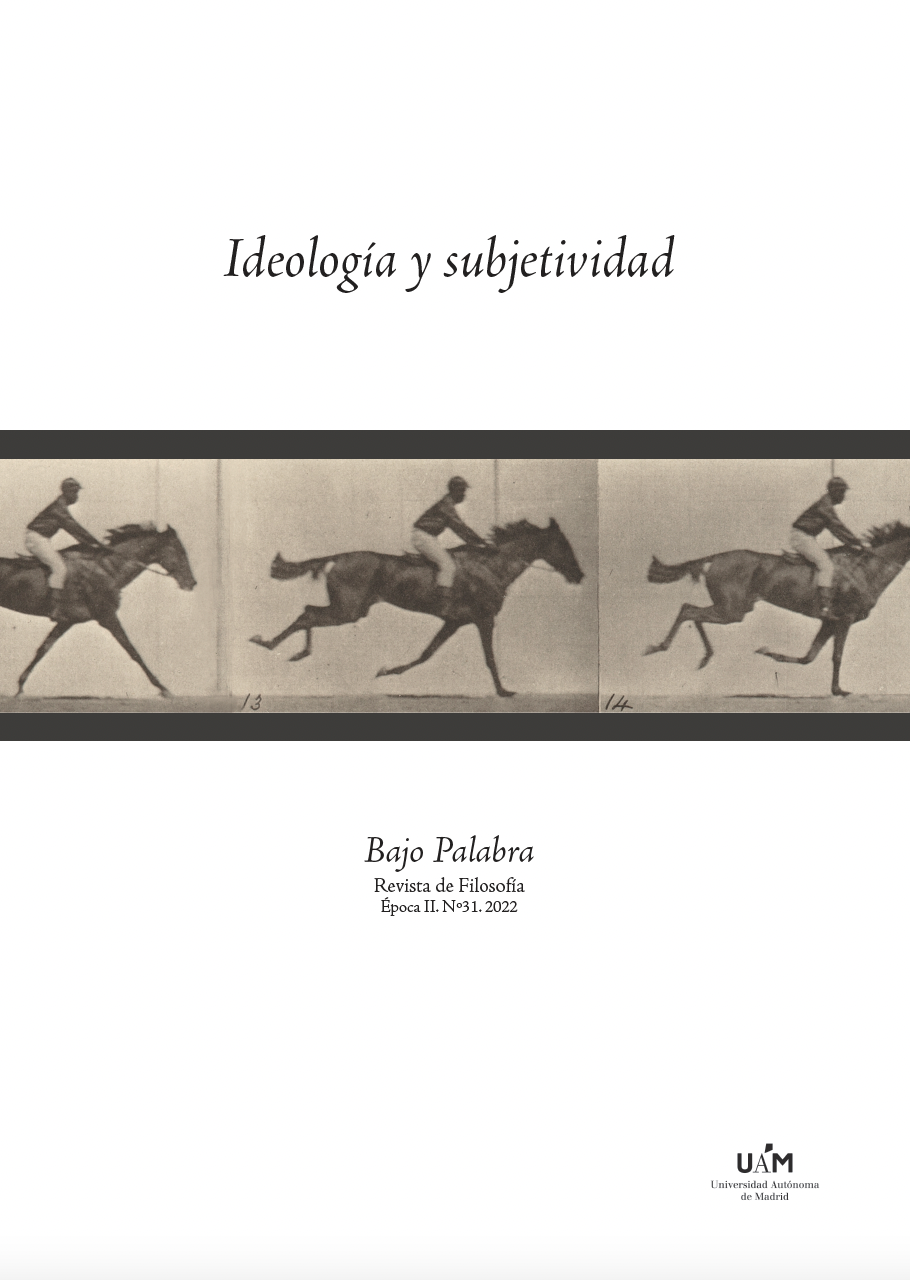On the aesthetic ideology of the formless: a commentary on the contributions by Adorno and Bataille
Keywords:
ideology, formless, modernism, materialism, musique informelle.Copyright (c) 2022 Ramón del Buey Cañas

This work is licensed under a Creative Commons Attribution 4.0 International License.
Abstract
Abstract: This article is a commentary
on two theoretical contributions regarding
the aesthetic ideology of the formless,
understood as a particular way in
which the opposition between the content
and the form has been constitutive
of aesthetic modernism. The two theoretical
contributions are those pointed out
in Georges Bataille’s L’Informe (1929)
and in T. W. Adorno’s Vers une musique
informelle (1961). In order to analyze
the most relevant theses outlined in both
texts, we will elaborate a critical reading
of Martin Jay’s approach to this question
in his essay Modernism and the retreat
from form (1991).
Downloads
References
Adorno, T. W. & Benjamin, W., Correspondencia: 1928-1940, Madrid, Trotta,
Adorno, T. W., “Vers une musique informelle”, en Escritos musicales I-III, Madrid,
Akal, 2006, pp. 503-549.
Attali, J., Ruidos. Ensayo sobre la economía política de la música, Madrid, Siglo
XXI, 1995.
Bataille, G., La conjuración sagrada. Ensayos 1929-1939, Buenos Aires, Adriana
Hidalgo Editora, 2003.
Bataille, G., OEuvres complètes (Tome 2): Volume 2, Ecrits posthumes (1922-1940),
París, Gallimard, 1970.
Cage, J., Silence: Lectures and Writings. Connecticut, Wesleyan University Press,
Didi-Huberman, G., La ressemblance informe, ou Le gai savoir visuel selon Georges
Bataille, París, Macula, 1995.
Fédida, P., Le Mouvement de l’informe, “La Part de l’OEil”, 10, 1994, pp. 21-27.
Hervás Muñoz, M., Pensar con los oídos: conocimiento y música en la filosofía de
T. W. Adorno, Tesis doctoral, Barcelona, Universitat Autònoma de Barcelona,
Horkheimer, M., Gesammelte Schriften XVI: Briefwechsel 1937-1940, Berlin, Fischer
Taschenbuch, 1995.
Jay, M., The Dialectical Imagination. A history of the Frankfurt School and the Institute
of Social Research 1923-1950, Canada, Little Brown and Company, 1973.
Jay, M., Adorno. Massachusetts, Harvard University Press, 1984.
Jay, M., Marxism and Totality: The Adventures of a Concept from Lukács to Habermas,
Berkeley, University of California Press, 1984.
Jay, M., Campos de fuerza. Entre la historia intelectual y la crítica cultural, Barcelona,
Paidós, 2003.
Jay, M., Ojos abatidos. La denigración de la visión en el pensamiento francés del siglo
XX, Madrid, Akal, 2007.
Krauss, R., “Corpus delicti”, October, nº 33, 1985, p. 34.
— 107
Krauss, R. & Bois, Y.-A., Formless: A User’s Guide, Nueva York, MIT Press, 1997.
Macherey, P., “Georges Bataille y la inversión materialista”, en ¿En qué piensa la
literatura?, Bogotá, Siglo del Hombre, 2003, pp. 141-164.
Marasco, R., “Georges Bataille. Aleatory Dialectics”, en The Highway of Despair:
Critical Theory After Hegel, University Press Scholarship Online, 2015, DOI:
7312/columbia/9780231168663.001.0001.
Lacan, J., “Los cuatro conceptos fundamentales del psicoanálisis”, en El seminario.
Libro 11. Buenos Aires, Paidós, 1986.
Lyotard, J.-F., La condición posmoderna. Informe sobre el saber, Madrid, Cátedra,
Ross, K., El surgimiento del espacio social. Rimbaud y la Comuna de París, Madrid,
Akal, 2018.
Russolo, L., El arte de los ruidos, Buenos Aires, Dobra Robota Editora, 2018.
Schaeffer, P., Tratado de los objetos musicales, Madrid, Alianza, 1988.
Schoenberg, A., El estilo y la idea, Barcelona, Idea Books, 2005.
Stravinsky, I., Poética musical, Barcelona, Acantilado, 2006.
Tenti, G., “Formless”, en International Lexicon of Aesthetics, Milán, Mimesis, vol.
, 2021.
Weiner, P. P., Dictionary of the History of Ideas, Nueva York, Charles Scribner’s
Sons, 1973.
Weingrad, M., “The College of Sociology and the Institute of Social Research”,
New German Critique, Otoño, 2001, Nº. 84.
Xenakis, I., Formalized Music. Bloomington, Indiana University Press, 1971.
